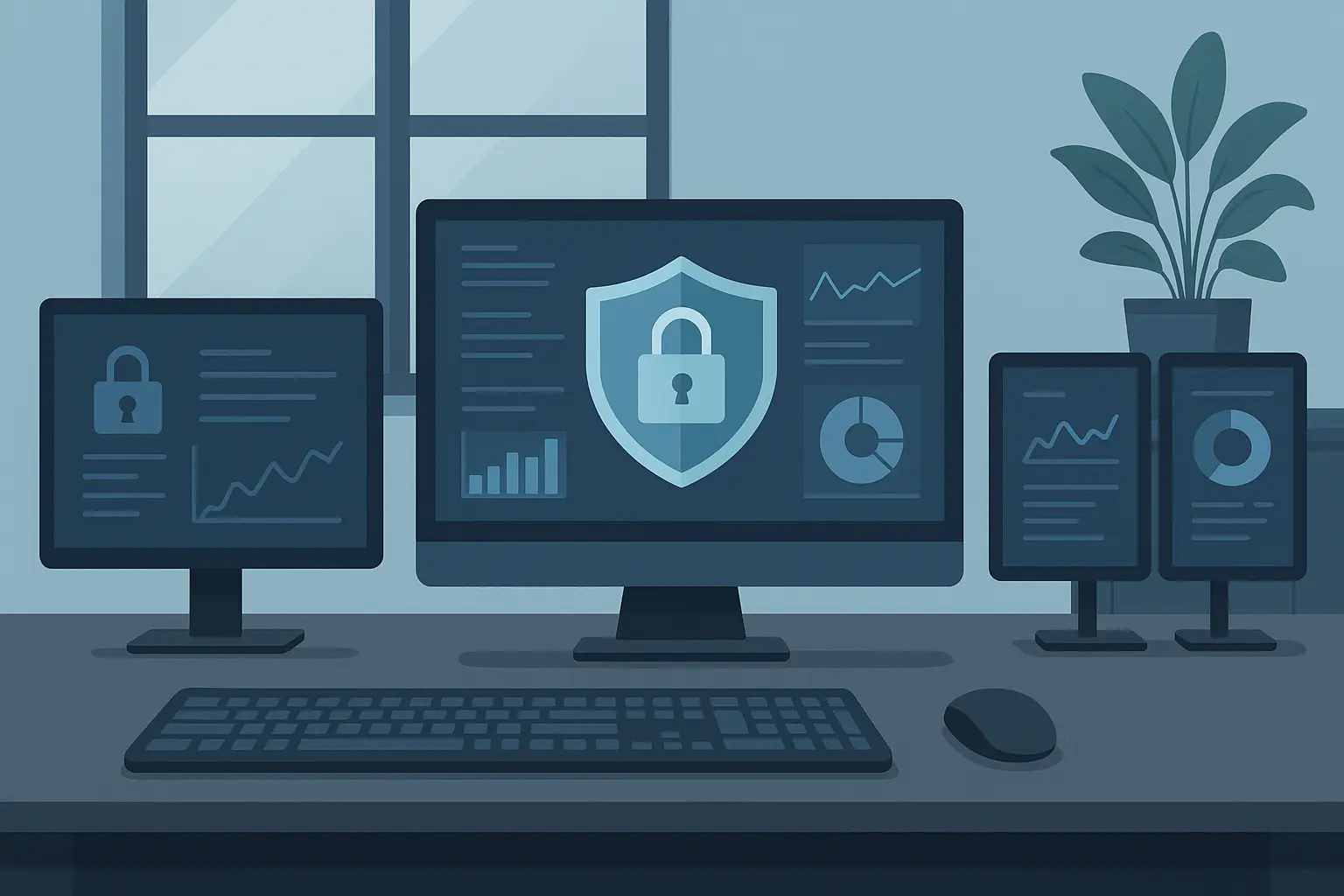When I started researching CompTIA Security+ salaries, I expected to find the usual vague ranges everyone talks about. What I discovered was way more interesting – and useful – than the generic ‘$50K-$100K’ answers you see everywhere.
The cybersecurity field has experienced unprecedented growth, with IT professional salaries growing an average of $20,000 between 2022 and 2023 according to Skillsoft’s 2023–2024 IT Skills & Salary Report. This surge reflects the critical importance of certified professionals in today’s threat landscape.
Table of Contents
-
The Real Numbers (No BS)
-
Experience vs. Pay: Your Earning Timeline
-
Where the Money Actually Is
-
Geographic Reality Check
-
Career Paths That Actually Pay
-
Contract vs. Full-Time: The Real Math
-
Remote Work: What Actually Changed
-
How to Negotiate (And What Actually Works)
TL;DR
-
Security+ gets you $52K-$65K starting out, with big jumps possible if you’re strategic about location and industry
-
Government and defense pay the most (especially with clearance): $70K-$110K
-
Your location matters more than you think – same job can pay 40% more in the right city
-
The real money comes from what you do after Security+: specialization paths like pen testing ($75K-$120K) and security architecture ($85K-$130K)
-
Contract work pays more per hour ($40-$75) but you’re on your own for benefits and job security
-
Job hopping every 2-3 years early in your career is how you actually increase your CompTIA Security+ salary
The Real Numbers (No BS)
Here’s what Security+ actually pays: You’re looking at $52K-$95K annually, but that massive spread isn’t random. It reflects real market dynamics that you can navigate if you know what you’re doing.
I spent months analyzing data from multiple sources, and the numbers you see online often miss the nuances that determine what you’ll actually earn. Your CompTIA Security+ jobs salary depends on a combination of experience, location, industry, and how well you leverage the certification.
Why the Range Is So Wide
That $43,000 difference between low and high isn’t just experience – it’s strategic positioning. A Security+ holder in government contracting with a clearance makes nearly double what someone in education earns. Same certification, completely different markets.
|
Experience Level |
Salary Range |
What Drives the Number |
|---|---|---|
|
Entry-Level (0-2 years) |
$52,000-$65,000 |
Certification premium, location, industry |
|
Mid-Career (2-5 years) |
$65,000-$80,000 |
Specialized skills, leadership potential |
|
Senior-Level (5+ years) |
$80,000-$95,000+ |
Management duties, strategic expertise |
|
Specialized Roles |
$75,000-$130,000+ |
Pen testing, architecture, consulting |
The 15-25% premium you get over non-certified candidates is immediate. Employers recognize Security+ as proof you understand fundamental security concepts, which translates to higher starting offers right away.
Experience vs. Pay: Your Earning Timeline
Fresh Security+ holders can expect $52K-$65K starting out. That’s a solid 15-25% boost over non-certified candidates, which makes the certification investment pay for itself within weeks.
My neighbor Jake went from help desk at $42K to SOC analyst at $61K within six months of getting his Security+. The catch? He had to move from Ohio to Virginia. Here’s the math that made it worth it: $19K salary increase minus $8K higher living costs equals $11K net gain, plus way better career prospects.
The 2-5 Year Sweet Spot
This is where Security+ professionals see the biggest jumps: $65K-$80K. You’re past entry-level but haven’t specialized so much that you’re limited to specific niches. Companies know you can contribute immediately while still being moldable.
According to CompTIA’s IT Salary Calculator, cybersecurity specialists with Security+ certification can earn a median annual salary of $112,000, demonstrating the significant earning potential as professionals advance in their careers.
Senior Level: Where Leadership Pays
Security+ holders in senior roles ($80K-$95K+) combine technical knowledge with business impact. You’re not just implementing security – you’re making decisions that affect the entire organization. That strategic responsibility justifies the premium pay.
Recent industry analysis shows that security architects lead across every compensation category with an average base salary of $179,000 and total annual cash compensation of $206,000, highlighting the significant earning potential for Security+ professionals who advance into specialized architectural roles.
Where the Money Actually Is
Not all industries value Security+ the same way. Here’s the hierarchy of who pays the most:
Government and Defense: The Clear Winner
Federal positions and defense contractors offer $70K-$110K, especially with security clearances. This isn’t just preference – Security+ is often mandatory, which creates a smaller candidate pool and drives up compensation.
Mike transitioned from private sector IT support ($45K) to defense contractor requiring Security+ and Secret clearance ($78K). That’s a 73% increase from targeting an industry where his certification was required, not just preferred.
Finance and Healthcare: Compliance Pays
These heavily regulated industries need professionals who understand both security principles and regulatory requirements. HIPAA and PCI-DSS compliance isn’t optional, so they pay $65K-$90K for people who can handle both.
Tech Companies: High Ceiling, Variable Floor
Base salaries run $60K-$100K, but total compensation can be much higher with equity and bonuses. The math gets interesting when you factor in stock options and performance bonuses that can double your base pay.
|
Industry Sector |
Average Salary Range |
Why They Pay More |
|---|---|---|
|
Government/Defense |
$70,000-$110,000 |
Security clearance requirements |
|
Financial Services |
$70,000-$95,000 |
PCI-DSS and regulatory oversight |
|
Healthcare |
$65,000-$90,000 |
HIPAA compliance mandates |
|
Technology |
$60,000-$100,000+ |
Competition for talent, equity upside |
|
Manufacturing |
$55,000-$75,000 |
Operational technology security |
|
Education |
$50,000-$70,000 |
Budget constraints, steady growth |
Geographic Reality Check
Location matters more than most people realize. A Security+ holder in San Francisco makes 40% more than someone in Kansas City. But after rent, they might actually take home less. Here’s how to do the real math.
High-Dollar Metropolitan Markets
West Coast Tech Centers ($75K-$125K): Silicon Valley and Seattle pay top dollar but demand top performance. The high CompTIA Security+ jobs salary reflects both competitive markets and crushing living costs.
East Coast Financial Hubs ($70K-$115K): New York and DC corridor combine financial sector demand with government contracting opportunities. More reasonable cost of living than West Coast, better career stability.
Emerging Markets: Better Value
Mid-tier cities like Austin, Denver, and Nashville offer competitive salaries with lower living costs. You get 80% of the big city salary with 60% of the living costs. The math works.
According to recent market data, San Francisco cybersecurity roles average around $156,652 per year for entry-level to mid-level positions, but you need to factor in housing costs that can eat 50% of your gross income.
Career Paths That Actually Pay
Your Security+ gets you in the door. Here’s where you go to actually make serious money:
The SOC Analyst Track
SOC Analyst → Security Engineer → Architect ($62K → $85K → $120K)
SOC work gives you hands-on experience with security tools and incident response. Every incident you handle increases your market value. It’s like getting paid to build your resume.
Penetration Testing: If You Like Breaking Things
$75K-$120K for ethical hackers
Your Security+ provides the foundation, but you’ll need additional certifications like CEH or OSCP. Companies pay premium rates because pen testers prevent potentially catastrophic breaches.
Security Architecture: Strategic Planning
$85K-$130K for designing security frameworks
This combines your technical Security+ knowledge with business strategy. You’re not just implementing security – you’re designing the frameworks that protect entire organizations.
Jennifer started as a Security+ certified SOC analyst earning $62K. Over five years, she specialized in cloud security architecture and earned AWS certifications. She now makes $118K as a Senior Security Architect – nearly doubling her income through strategic specialization.
Career Advancement Checklist:
-
☐ Pick a specialization aligned with your interests and market demand
-
☐ Research additional certifications that complement Security+
-
☐ Build hands-on experience through labs and side projects
-
☐ Network with professionals in your target specialization
-
☐ Create a realistic 2-year advancement plan
-
☐ Document everything you learn and accomplish
-
☐ Prepare for specialized role interviews and technical assessments
Contract vs. Full-Time: The Real Math
Here’s the real talk on contract work: You’ll make $40-$75/hour, which sounds amazing until you realize you’re paying for your own health insurance ($500+/month), have zero paid vacation, and might be unemployed next month.
I’ve seen people make this work, but only if you’re disciplined about saving and okay with uncertainty. The higher hourly rate needs to cover benefits worth $15K-$25K annually that full-time positions include.
When Contract Work Makes Sense
-
You’re experienced enough to command premium rates ($60+/hour)
-
You have a spouse with benefits or can afford individual coverage
-
You’re building specialized skills for future permanent roles
-
You can handle income variability and save accordingly
Full-Time Benefits Beyond Salary
Permanent positions offer stability, comprehensive benefits, and career development opportunities. Health insurance, retirement matching, and paid time off add significant value that contract positions rarely match.
Remote Work: What Actually Changed
Remote work changed everything, but not how you think. Yes, you can sometimes get Bay Area money while living in Ohio. But most companies are getting smarter about location-based pay.
The Reality of Geographic Arbitrage
Some companies still pay based on their headquarters location regardless of where you live. Others adjust salaries based on your location. The key is finding the companies that haven’t adjusted their pay scales yet.
Remote work’s biggest benefit isn’t salary arbitrage – it’s access to opportunities. You can work for a DC defense contractor from anywhere, or a Silicon Valley startup from your hometown. That expanded job market is where the real value lies.
How to Negotiate (And What Actually Works)
Your Security+ certification gives you concrete talking points for salary negotiations. Frame your requests around the specific benefits you bring: reduced training time, verified competency, immediate productivity.
What Actually Works in Negotiations
-
Research actual salaries for your specific role and location
-
Highlight the 15-25% premium Security+ holders command
-
Mention specific skills and knowledge areas the certification covers
-
Show how you’ll reduce their training costs and time-to-productivity
For professionals considering whether formal education is worth the investment, Security+ certification offers a more direct path to cybersecurity careers with measurable salary impact.
Professional Documentation Matters
Your certification is only valuable if you can prove it. Professional presentation of your credentials directly impacts interview opportunities and salary negotiations. When considering professional display options for certificates, remember that visible credentials reinforce your expertise during video interviews and office meetings.
Sometimes important documents get lost or damaged. Whether you’ve misplaced your original Security+ certificate or need backup documentation for your professional portfolio, having proper certification documentation readily available ensures you never miss an opportunity due to paperwork issues.
Negotiation Planning Template:
-
Current market rate for your role: $______
-
Your target salary: $______
-
Security+ premium justification: 15-25% above non-certified
-
Specific skills you bring: ________________
-
Training costs you’ll save them: $______
-
Timeline for decision: ________________
Bottom Line
Security+ will get you $52K-$65K starting out, more if you’re smart about location and industry. The real money comes from what you do next. Pick a specialization, get experience, and don’t be afraid to job-hop every 2-3 years early in your career.
The professionals who maximize their Security+ investment think strategically about industry choice, geographic positioning, and specialization paths while building practical experience that employers value. Your certification provides the foundation – your career moves determine how much you actually earn.
For those considering additional educational investments alongside their Security+ certification, exploring different degree types can provide complementary credentials that further boost earning potential in cybersecurity leadership roles. Understanding various business certifications can also complement your technical Security+ credentials when pursuing business-focused cybersecurity roles.
The cybersecurity field rewards continuous learning and strategic positioning. Your CompTIA Security+ salary represents just the beginning of what’s possible with smart career planning and execution.








